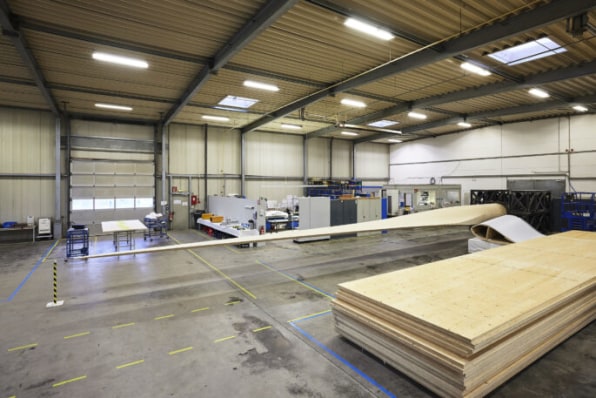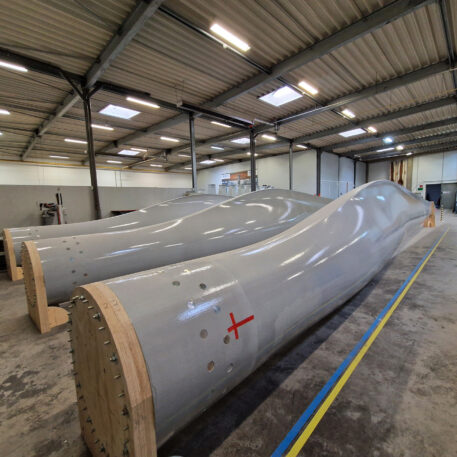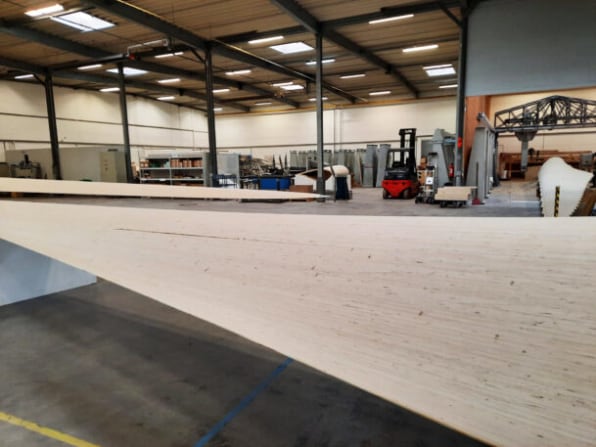When a wind turbine reaches the end of its life after two or three decades, the giant blades attached to it usually end up in a landfill.
That’s largely because of the materials that are used. “[The blade is] a sandwich of different materials that are all tied together with glue,” says Tom Siekmann, CEO of Voodin Blades, a Germany-based startup that recently designed a wooden version that could replace typical blades. “And even though it might be possible to recycle each component of that sandwich individually, it’s really difficult to take them apart and recycle them.” It’s even harder because blades can be longer than a football field and cumbersome to move.
The recycling process is so expensive that it typically doesn’t happen. If it does, the blades are downcycled into lower-quality products, like cement.

A couple of years ago, Siekmann was having drinks with friends who worked in the wind power industry, and the conversation turned to the problem. “We thought, Okay, what else can we do? What’s a more sustainable, easier-to-recycle material?” They started to consider wood. After some initial calculations showed that the design might be viable, they built small samples and then a prototype.

Voodin Blades uses high-tech laminated lumber, a very strong material that has similar characteristics to glass fiber, held together by a glue designed to work with wood. The startup, which was part of the latest cohort at a sustainable design accelerator called Circular Valley, is thinking carefully about how the material can avoid landfills.
If a wind turbine using the new wooden blades is dismantled, the blades can be reused or repurposed for construction or other products. If they aren’t reused, they can also be burned; the process is carbon neutral, since the wood contains CO2 that was recently captured from the atmosphere by trees. If for some reason they’re thrown out, they’re biodegradable.
Because the manufacturing process uses far less energy than making a typical blade, and because it avoids components made from fossil fuels, the carbon footprint of production is 78% smaller. The design also enables more automation in manufacturing, so the company expects it to be 20% cheaper to produce than standard blades.

The company recently manufactured a prototype that will be tested on a small wind turbine after getting regulatory approval. It will also soon begin working with a wind turbine manufacturer to design much larger custom blades for state-of-the-art turbines.
Wind turbine manufacturers have known about the end-of-life problem for years, but because a turbine might last 35 years, they waited to address it. Now it’s becoming more urgent. Globally, as many as 14,000 blades may be decommissioned each year over the next few years, and that number will grow. By 2050, it could add up to 43 million metric tons of waste.
Inicia sesión para agregar comentarios
Otros mensajes en este grupo.

For more than a decade, social platforms have faced criticism for embedding algorithms that fuel compulsive behaviors, encourage doomscrolling, and measure success by time spent glued to screens.

A new startup called Ridley wants to make it cheaper to sell a home by challenging the traditional real estate commission model.
Founder and CEO


For all the many features it’s been lobbing into the world lately, Trello hasn’t given its most dedicated fans the one thing many of them crave most—and that’s a ticket back in t

Over the past three years, I’ve changed email providers three times without ever changing email addresses.
That’s because my address is entirely under my control. Instead of relying on a

If you dread the weekly grocery shop, or get sidetracked by fun snacks only to end up with no real meals, this might be the hack for you.
The 5-4-3-2-1 method gives shoppers like you a s

